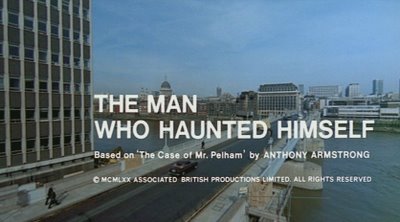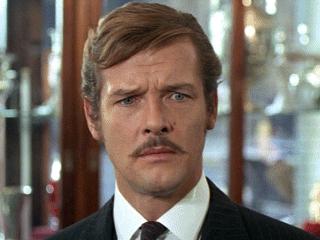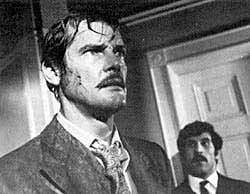|
The Man Who Haunted Himself - Roger Moore's Finest Hour?

The Man Who Haunted Himself is a cult 1970 British film directed by
Basil Dearden and based on the novel The Strange Case of Mr Pelham by
Anthony Armstrong and an episode of Alfred Hitchcock Presents that
previously adapted the story. The film is an intriguing and overlooked
psychological thriller with a supernatural atmosphere and stars future
James Bond Roger Moore as a successful but uptight and work obsessed
businessman called Harold Pelham. Driving home from his job in the city
one afternoon, Pelham has a very bad car accident that leaves him
fighting for his life and a strange incident duly occurs in the
hospital. Pelham is declared momentarily dead and two hearts briefly
flicker on his monitor but he recovers and returns home, eventually
resuming his job again after a short break abroad. Back at work though,
some very odd things soon start to occur in Harold's life. Colleagues
keep mentioning meetings or conversations they've had with him that
Pelham has no memory of whatsoever and he is even told he's apparently
agreed to a merger of the company despite being adamant he made no such
decision. Pelham is more perplexed than ever when informed he was
clearly seen playing billiards in London on a day when he knows for a
fact he was recuperating in Spain. As these incidents escalate it
almost appears to Pelham that he has a strange double or imposter who
always seems to be one step ahead of him and who somehow represents the
more wild and suppressed nature of his personality, causing all manner
of mayhem to his own life. Is Pelham going mad? The victim of an
elaborate practical joke? Or does he really have a malevolent
doppelganger attempting to take over his life?

The Man Who Haunted Himself is undoubtedly Roger Moore's finest hour
outside of his long stint in the tuxedo and safari suit as James Bond
and this likable and absorbing Twilight Zone style mystery shows that
the oft-maligned and rather self-deprecating star was in reality always
a lot better than he or anyone else ever gave him credit for when
actually required to do some acting. It's no surprise that Moore has
always spoken of The Man Who Haunted Himself in fond terms and
considers it one of his very best roles and pictures. He gives a
surprisingly skillful and natural performance here as the increasingly
confused and rattled Pelham and makes the plight of the central
character both believable and moving at times. It's great to see the
actor, in his suave prime just a few years prior to landing the Bond
role for 1973's Live and Let Die, in such a dark, eerie and enjoyable
film and you just know The Man Who Haunted Himself is going to be a lot
of fun right from the start when some funky seventies music opens the
film to shots of Roger driving his sleek little sports car past some
famous London landmarks.
The car crash that occurs very early in the film is enjoyably strange
and slightly delirious as we see Roger Moore looking increasingly nutty
and maniacal behind the wheel and dangerously upping his speed on the
motorway, hinting at the repression of a personality who is not the
staid, ordinary Harold Pelham but a more reckless version. The brief
hospital scenes are nicely atmospheric too with a vaguely surreal and
psychedelic tinge. In terms of mood, The Man Who Haunted Himself is not
a million miles away from one of those episodes of Hammer House of
Horror or Hammer House of Mystery and Suspense but much slicker and
more polished and without the campy horror elements.

A strength
of the film I think is that it seems to use some real locations rather
than be too studio bound and constricted. You get a good authentic
sense of London and a nice British atmosphere with plenty of shots of
the Thames and the pin-striped boardroom shenanigans always feel quite
realistic. The world of gentlemen's clubs, billiard rooms, scotches and
wood paneling depicted here is quite charming in its own dated way and
Roger Moore, with mustache, is certainly believable as a suave
well-heeled business type. The world the film inhabits is an ordinary
one and it gives the central mystery more resonance as Pelham's refined
and ordered universe begins to be shattered and torn apart. There is a
real sense of paranoia in the film at times as Moore struggles to work
out what exactly is going on. Other great things about the office and
boardroom scenes are Anton Rogers who provides good support as Tony
Alexander, Pelham's work colleague and confidant, and Thorley Walters
as Pelham's cheery friend Frank.
Basil Dearden, who was of course involved in the supernatural Ealing
classic Dead of Night, does a great job here in slowly amping up the
tension and psychological strain on Pelham and the film works well by
developing at its own pace. I also like the way the film goes for a
more realistic approach rather than descend into cheap shocks or
straight ahead horror. The Man Who Haunted Himself is genuinely
gripping as Pelham's double exerts more and more influence on his life
and the sequences where Pelham arrives somewhere and is informed he was
already there only minutes previously are suitably creepy. You are
always curious to get to the heart of mystery and follow Pelham as he
tries to make sense of it all with the theme of loss of identity an
absorbing and slightly unsettling concept here. Most of all though you
want Pelham to catch-up with his apparent doppelganger and the film
uses this angle very well as Moore's character desperately tries to
make their paths cross and meet this strange imposter for himself.

Alastair Mackenzie also does a good job as Moore's wife Eve in the film
when the wild antics of the apparent duplicate begin to affect Pelham's
home life in various ways. "I'd like to do something reckless," says
the bored Eve, who we suspect would find the Pelham doppelganger a lot
more interesting than the work obsessed real thing. Roger Moore is very
good too in a touching scene where he is utterly bewildered to meet
Julie (Olga Georges-Picot), a woman who he has apparently been having
an affair with and who knows him well - despite him not having any
memory of her whatsoever. Georges-Picot, who will always be the
statuesque Countess Woody Allen comically attempts to seduce in Love
and Death to me, is well cast in the film, as is Freddie Jones as Dr
Harris, a psychiatrist Pelham consults.
The Man Who Haunted Himself is a very entertaining and gripping mystery
with a spooky atmosphere and nice direction by Basil Dearden. It has a
nice supporting cast, good music and gives Roger Moore his best ever
role outside of James Bond. A fun little British film that has been
somewhat forgotten over the years and is well worth watching.
- Jake
c 2009
Alternative 007
|

|


